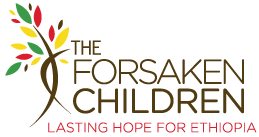One of TFC's objectives is to help its Ethiopian partners become self-sustaining. Sustainability is a two-part process. It requires generating additional resources to combat ever-growing problems, and it also requires reducing the resources needed by preventing the problems sending children to the streets in the first place. One of those problems is child trafficking. Many children from southern Ethiopia are taken each year to provide forced labor for the weaving industry in Addis Ababa. These children, after years of labor and abuse, will eventually find themselves trapped on the streets of Addis Ababa.
“Girls from Ethiopia’s rural areas are exploited in domestic servitude and, less frequently, prostitution within the country, while boys are subjected to forced labor in traditional weaving, herding, guarding, and street vending. Brokers, tour operators, and hotel owners in the Southern Nations, Nationalities, and Peoples Region (SNNPR) facilitate child prostitution for tourists.” - US State Department's Trafficking in Persons Report 2012
Via Kota Ganate, the agricultural branch of our ministry, TFC is helping implement two strategies to combat the problem of child trafficking:
- economic empowerment of rural farmers
- direct intervention with the poorest children/families
Children from poor families are the most vulnerable to child trafficking. Therefore, in this agriculture-based society, we believe improving the economic condition of rural families by improving the livelihoods of small farmers will directly reduce the incidence of child trafficking. Kota Ganate hopes to accomplish this by focusing on developing dual-purpose crops - products that benefit our organization as well as rural farmers.
For example, because poultry products are in high-demand throughout Ethiopia, we focus on breeding strong chickens so we can produce even more high quality chickens. This is much more difficult and costly to initiate than raising chickens for meat or egg production, but it accomplishes more for rural farmers. By breeding and hatching quality, productive chicks and making them available to local farmers, we allow them to produce a very valuable product and to tap into a market that has been largely closed to them in the past. Our partners also benefits from the income generated from the sale of chicks.
Another example of a dual-purpose crop is high yielding potatoes. Two years ago another organization experimented with an improved variety of potato in Chencha, Ethiopia. This type of potato yields as much as eight times more of a crop than the local varieties of potatoes. Kota Ganate obtained some of these super potatoes and started growing them for seed, and today these seed potatoes are available to local farmers. Again, this crop serves two porposes, generating income for our partners and allowing local farmers to dramatically increase their yields.
In addition to empowering rural farmers, TFC and its partner are also working to prevent child trafficking by intervening directly with the poorest children - the most vulnerable children - in this area. In fact, some of them have been victimized in the past and are now reunited with their families. TFC helps implement our key strategies of Christ-centered mentoring and family strengthening with these children. Also, we provides tangible support in the form of school fees, food and medical support, new clothes, etc. For these most vulnerable children, we have the long-term goal of improving the condition of the next generation by supporting and strengthening their families, providing for their education, and ensuring their physical well being.
Please pray with us that this 2-pronged approach to sustainability will be effective in reducing child trafficking and promoting the transformative power of Jesus Christ in Ethiopia!
Give to The Forsaken Children and support sustainability.


